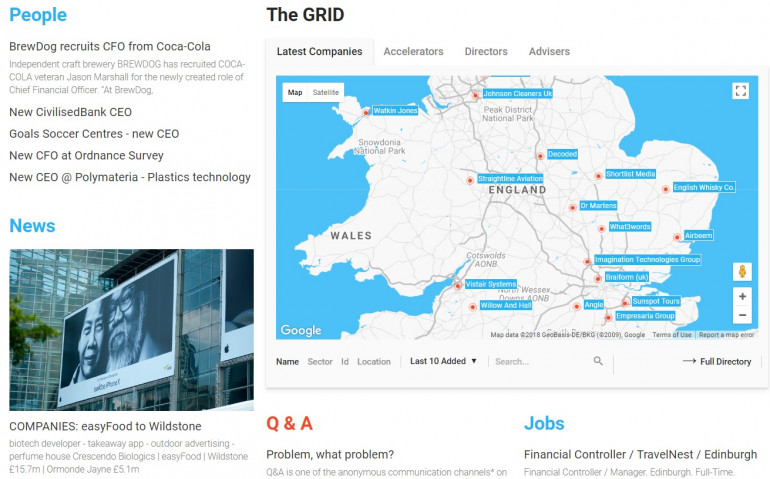Published by Directorzone Markets Ltd on July 1, 2016, 3:34 pm in Knowledge, Market Info
Wednesday January 1st 2020

Brexit effect | Corporate accelerators + China | Big accountants’ software for SMEs | Euro tech big ones | Payment pain | Manchester rises | Microsoft Links In to Big Data | Exporters grow faster | More female entrepreneurs | Scale-ups need talent | AIM gains | Content marketing @ City AM
Digest of news and trends in the GRID marketplace in June 2016:
BREXIT EFFECT
UK SMEs count the cost of Brexit as banks reassure clients | Andrew Bounds and Kate Burgess, FT. June 30
The UK’s 5.4m small and medium-sized enterprises now facing the prospect of a split from the EU. While only an estimated 6 per cent of these businesses export to the single market, many more rely on it for workers or are part of EU-wide supply chains. Already there are signs that businesses are rethinking investment plans and having credit lines pulled.
CRU KAFE, a small maker of coffee pods, says its recent £1.25m funding round would have flopped if it had come after last week’s EU vote. “Overnight, funding UK start-ups has become less attractive,” says Colin Pyle, cofounder. “We’re competing in a global market and exiting from the EU represents a substantial risk in the eyes of investors.”
Britain’s SMEs, which employ 15.6m people, 60 per cent of all private sector employment in the UK, were hit particularly hard by the credit crisis, as banks withdrew lending to the sector. The biggest threat now would be a domestic recession, affecting non-exporters, or a financial freeze.
FINNCAP, the small-cap broker, points to pharmaceuticals and biotech as sectors that could particularly suffer from Brexit as they benefit from EU research and university funding and regulation.
London’s booming fintech market under threat from Brexit vote | Harriet Agnew and Emma Dunkley, FT. June 28
London’s crown as the global capital of fintech is under threat by the decision to leave the EU amid worries about a squeeze on future funding and a brain drain of talent out of the UK. The UK has been at the forefront of the fintech — financial technology — revolution of the lending, money transfer and banking markets, supported by government initiatives to help investment in a fast growing sector.
In 2015, the British fintech sector generated £6.6bn in revenues and attracted roughly £524m in investment, according to EY, the professional services firm. Fintech firms employ about 61,000 people — about 5 per cent of the total financial services workforce — making the UK larger than rival techhubs in New York, as well as Singapore, Hong Kong and Australia combined.
But this could easily change, according to company executives and investors, some of whom have begun to question their future in the UK.
Edan Yago, founder of EPIPHYTE, which helps firms make transactions using blockchain, warns that his firm might have to consider relocating if the UK severs ties with Europe. Epiphyte had moved headquarters from San Francisco to London to take advantage of the English capital’s position as a financial centre.
Companies such as TRANSFERWISE, ZOPA and RATESETTER put the UK’s fintech industry at the forefront of transforming how companies and individuals raise, lend and transfer money.
The British fintech scene has flourished in part owing to close links with the large global investment banks, which have used the UK as a base for their Europeans operations to trade across the rest of the bloc under so-called “passport” rules. Many of the largest banks have begun to take action to prepare for a shift of operations out of the UK, which would make London also less attractive for the fintech companies which work with them.
“Brexit will change things dramatically for London’s fintech community,” says Diana Paredes, co-founder of SUADE, a fintech company that designs regulatory software for banks.
But as importantly, fintech companies also use the passporting rules to access Europe, which means that the British split from the EU could directly impede their operations. “Companies [may] have to go country by country setting up subsidiaries and getting local authorisation, which is time consuming and ultimately could be cost prohibitive,” says Neville Lacey, head of UK and Europe for OZFOREX GROUP (OzForex Limited ABN 65 092 375 703, trading as “OFX” and regulated in Australia), a money transfer business.
Fintech companies are also concerned that Brexit could make it more expensive and complex for them to attract and retain talent. Many of them employ developers from countries such as Portugal and Poland. “The general worry is a brain drain of talent and skills,” says Kathryn Parsons, chief executive of DECODED, a tech company that teaches digital literacy. “Some of the best tech talent is from overseas.” Jared Jesner, chief executive of WESWAP, an online currency exchange, said that half of its team were from European countries.
CORPORATE ACCELERATORS + CHINA
Big UK businesses take centre stage as start-up incubators | Nicholas Megaw, FT. June 23
Accelerators — or incubators — offer training and mentorship for start-up businesses. Companies organising them often provide office space and the opportunity of investment, usually of up to £200,000, or work contracts. They hope that by working with disruptive technologies from an early stage, they will not lose business to them later — or have to buy them out at high valuations.
European companies now support as many accelerators as governments do, and are catching up with traditional venture capital-backed programmes. Corporations provide the main funding for 27 per cent of accelerators, compared with 32 per cent funded by venture capital, according to OpenAxel, an EU-funded start-up initiative.
In the latest sign of business interest, more than 80 companies gathered for the second “corporate acceleration summit” as part of London Technology Week on Wednesday.
JOHN LEWIS, the British department store chain ….is one of an increasingly diverse range of UK companies to invest in homegrown start-ups. When John Lewis opened its accelerator — JLAB — hundreds of start-ups applied for a place. The retailer encouraged applicants to “surprise us” with innovations “so out of this world they can’t be classified”. The final 25 start-ups pitching to John Lewis this month included a platform for women to borrow their wardrobe on a monthly subscription and software that uses artificial intelligence to predict and detect crime.
Technology and finance groups such as MICROSOFT and BARCLAYS have been running start-up accelerators for years. They are now being joined by a more unusual cast of peers:
TOPSHOP, owned by Sir Philip Green’s Arcadia Group, is focusing on new developments in wearable technology.
BELRON, the company behind Autoglass, is working with five start-ups including “SORRY AS A SERVICE”, a British and Estonian group that allows businesses to automatically send bespoke gifts to valued or dissatisfied customers. Nick Burton, head of digital and innovative technology at Belron, says “helping to change mindsets is the key benefit”. “We want to inspire our staff by seeing the pace at which a start-up can make decisions or change course and bring things to life.”
The challenges that come with running a large company mean even those that were recently start-ups themselves are forging links with new innovators. Cliff Cohen, chief information officer at ASOS, the online fashion retailer, says “there’s a huge opportunity to tap into another whole network of great tech and really clever people. There will always be a great idea we may not come up with ourselves.”
Fears that bigger companies could exploit inexperienced start-ups with unfair terms has made some in the industry distrustful of corporate-controlled accelerators. But operators say start-ups are keen to sign up to their schemes, particularly as alternative sources of funding dry up.
Innovation specialist L MARKS has assisted Topshop, John Lewis and Belron in setting up their programmes, and is part of a growing mini-industry dedicated to helping corporations move into the start-up world. Stuart Marks, L Marks chairman.
UK-based WAYRA, for example, started as an accelerator for Spanish telecoms group Telefónica, and has since expanded to run programmes with other companies such as Asos and MSD, the US drugmaker.
A partnership with Lockheed Martin, the aerospace group, led technology merchant bank RESTORATION PARTNERS to create VTC Group, a network to connect start-ups and multinationals, in March. VTC chief executive Auriol Stevens.
Questions remain over the value these funds bring companies. A recent report by OpenAxel finding that an “overwhelming majority” of accelerators do a poor job in measuring the impact of their activities. The rapid proliferation and warnings of an “accelerator bubble” means companies will have to focus more closely on returns.
Gary Stewart, director of TELEFÓNICA OPEN FUTURE UK, says its start-ups have so far attracted $86m in third-party investment and generated 64 trials or contracts with Telefónica.
British companies are not the only groups trying to take advantage of the UK’s growing technology scene. The Chinese government is also taking notice — on Wednesday groups from Shanghai launched their own business accelerators in London.
Shanghai Innovation Centre and Shanghai Technology Exchange are set to open branches at an innovation centre run by COCOON NETWORKS, the incubator and venture capital firm backed by China Equity Group. Cocoon runs accelerators for fintech and green tech start-ups. This year it launched a £500m venture capital fund to invest in European companies. John Zai, chief executive of Cocoon Networks.
Allan Chou, a partner at Beijing’s first privately owned incubator CHEKU CAFE, said investors were being encouraged by a relative scarcity of projects in China, compared with growing amounts of investment capital. “That’s why we’re here, to find out how we can collaborate with teams and companies and schools here to push out great technology and solve issues that we face,” Mr Chou added.
Chinese investment in Europe and the US reached record highs in 2015, and is forecast to grow again this year. This week China’s Tencent agreed an $8.6bn deal for a majority stake in gaming company Supercell, the Finnish mobile gaming company. The Supercell deal alone is worth more than a third of all Chinese investment in Europe last year.
BIG ACCOUNTANTS’ SOFTWARE FOR SMEs
Deloitte targets SMEs with cloud-based service | Harriet Agnew, FT. June 22
DELOITTE is targeting fast-growing start-ups and SMEs with a new accounting and analytics service, the latest example of how cheaper access to technology is allowing the “big four” professional services firms to expand their reach. The new cloud-based service is called PROPEL and has received £2.5m in funding from Deloitte’s Innovation Investments scheme, which encourages its entrepreneurial employees to turn start-up ideas into businesses.
As well as a core accounting service, clients have their own “dashboard”, which gives a real-time view of how their business is performing, in areas including its cash position, trends in web traffic and how sales are correlated to the weather. Propel’s prices typically range from £350 per month for a small start-up with up to three employees, to £1,500 per month for a larger business with 15-25 employees.
Alongside the core accounting service, Deloitte is offering business planning to its start-up and SME clients. Katie Houldsworth, Deloitte’s innovation partner for audit says: “….we can help with cash flow forecasting, creating budgets and attracting investment.”
Propel’s first pilot client was BANNEYA LONDON, a company that makes fine jewellery using 3D printing technology. Nimesh Thakrar, Banneya’s co-founder and CEO, says: “It’s been very helpful because it has meant I can concentrate on growing the business and the team, and thinking about fundraising. I can also speak to Deloitte about research and development, tax credits and payroll items.”
Deloitte’s Propel will work alongside market-leading providers of accounting to SMEs such as Sage, the FTSE 100 technology business; as well as newer technology-driven companies such as Receipt Bank, which removes the need for manual data entry of bills and receipts.
Traditionally, the “big four” have focused on medium-sized and larger companies — leaving the smaller companies to rivals such as Grant Thornton, BDO and RSM. However developments in technology and the automation of some core manual processes such as scanning receipts have made it economical for them to cast the net wider.
In October 2014 KPMG launched cloud-computing accountancy services for a fraction of its normal fees. The cloud-based software allows businesses to go online and prepare their accounts, do their bookkeeping, administer their payrolls, and file VAT and corporate tax returns. The service charges a monthly fee starting at £150, rather than the £600 plus per hour charged by senior partners for auditing or advising larger companies. It is aimed at helping KPMG to go after the “Googles of tomorrow”.
FT READER COMMENT: Samurai Snowboarder: “ There are already, a number of cloud based accounting systems out there - I've been using https://www.Clearbooks.co.uk for years. It may seem new to SME's who've never used a cloud accounting system; but I still wouldn't pay such a huge premium for this.”
EURO TECH BIG ONES
Europe tech start-ups valued at $1bn dwindle | Lauren Fedor, FT. June 20.
The number of European technology start-ups reaching a valuation of $1bn or more fell in 2015, but the sector is generating strong revenues compared to its US equivalent, according to new research.
Data compiled by GP BULLHOUND, the British investment bank, found Europe produced 10 technology start-ups that were either sold, floated on a stock exchange or valued by private investors at $1bn or more last year, compared to 13 in 2014. The US produced 30 tech start-ups valued at $1bn or more in 2015, while Asia proved the fastest-growing region, generating 19.
European tech entities that hit the $1bn valuation in 2015 included BLIPPAR, the UK computer vision group, German meal-kit company Hello Fresh and Swiss virtual reality start-up MindMaze.
US tech start-ups worth $1bn raised nearly twice the amount of capital as their European counterparts in 2015, according to Manish Madhvani, a managing partner at GP Bullhound. But on average European tech start-ups worth $1bn generated $315m in annual revenues, compared to $129m by their US counterparts, he said.
Britain remains the European country with the most start-ups valued at $1bn or more, with 18 based in the UK. Sweden is second, followed by Germany and France.
PAYMENT PAIN
Extract from full article at: “Nothing matters more than getting customers to pay” | Luke Johnson, chairman of Risk Capital Partners and the Institute of Cancer Research. The Sunday Times. June 12.
It is often the more mundane aspects of business that matter most — like getting paid. You can manufacture the most fantastic products in the world, but if you do not receive the money you’re due, then you will surely go bankrupt.
… consumer sectors such as hospitality and leisure, where you are paid in cash when you sell the goods …means you don’t carry the risk of bad debts, and you don’t have working capital tied up in debtors. It is part of the reason why start-ups are easier in industries such as retailing.
By contrast, producers and wholesalers must generally extend credit to their customers. As a result, they have to chase receivables — and sometimes never get what they are owed. Nagging recalcitrant debtors costs a lot of time and money.
Unfortunately, slippery customers often behave badly about the money they owe suppliers….To stop these problems, it is important to do thorough credit referencing on prospective clients in case they are rogues. A sound contract with clear terms of trade is also essential in case of disputes; wherever possible, it should state that the supplier retains title to the goods unless they are fully paid for. An accounts department should always submit invoices promptly, and ensure they are accurate, so leaving no room for wrangles.
Trade credit insurance is a way to protect against bad debts, with the UK market being dominated by three European firms: EULER HERMES, ATRADIUS and COFACE. It feels like an expensive service until a big customer goes bust owing you money. Unfortunately, credit insurers tend to withdraw cover from struggling clients, adding to their woes, so it is debatable how valuable they are for most firms.
Increasingly, companies try to sell repeat purchase items on subscription, with periodic direct debits or electronic transfers. This helps cashflow and planning enormously, and leaves less wriggle room for disputatious customers. ….It helps if you have a unique offering in a new sector; you can then dictate the terms of trade. But in more traditional, competitive markets with lumpy, irregular orders, organising payment by such means is generally impossible.
The government has introduced the PROMPT PAYMENT CODE to try to tackle the £32bn of overdue cash owed to medium-sized and small companies. It is a voluntary regime with about 1,800 companies signed up, including many larger ones.
One industry plagued with litigation, insolvency and rows about payments is construction. It is no coincidence that there are many more rich property developers than there are wealthy builders. After all, landlords receive quarterly rents in advance, and change the locks on their property if their payments are in arrears.
For exporters, getting paid by foreign customers is yet another challenge to add to the many legal, cultural and market obstacles faced by those bold enough to venture overseas. It is a big reason why so many global companies use local distributors: they can handle debt collection and judge credit risk so much better. As ever in business, so much is in the detail and execution.
FT READER COMMENTS:
ModestObserver – “Just on the customer side, companies do well to recognise that the process of getting paid starts before the order is taken, and continues with every stage of the progression of that order through to completion. The accounts department raising the invoice is only the final stage, and relies upon the previous processes having accurately performed their part. Then, if there is a delay in payment, it will be a matter of can't or won't - which, in either case, is a clear sign not to repeat the exercise.”
Peter Hobday - “Cash flow is not understood by many. If, in a recession, your big suppliers demand payment at 40 days rather than your previous 60 days, that extra 20 days is enough to put you into receivership if your bank won't lift your credit limit. That is a quite separate problem to late payers, and very important as the amounts of money can be much bigger. I have never seen an article about that dangerous side of the business - outgoings - and so it is rarely considered when getting involved in a company. It should be.”
MANCHESTER RISES
Manchester’s remarkable rise from the IRA rubble | Andrew Bounds, ft. June 15.
“Only two cities in the UK are growing in all directions: London and Manchester,” says David Thame, a freelance property writer who has chronicled the city for more than 20 years. Manchester’s economy has almost doubled in size in the last 20 years, while its population is up 26 per cent. The 6.6 per cent average annual growth rate is faster than the UK’s 5.1 per cent.
… the renaissance began before the bomb ….But the city, hit by recessions in the 1980s and 1990s as traditional manufacturing industry crumbled, was still shrinking.
… the rebuilding cemented links with businesses — and neighbouring boroughs.…developments such as the BBC’s MediaCity in Salford. The former industrial wasteland between Manchester and Salford Quays is filling up with new apartment blocks.
Manchester’s office market in 2015 was bigger than the combined space let in Liverpool, Leeds, Hull, Sheffield and Newcastle at a total of 2.5m sq ft.
While less than half its students come from the north-west, 7 in 10 stay after graduation, usually in Greater Manchester.
The Greater Manchester economy as a whole has grown by 60 per cent since 1996. Manchester itself has accounted for half its population growth.
MICROSOFT LINKS IN TO BIG DATA
Microsoft seeks to build smarter business software | Richard Waters, FT. June 16.
The staid world of enterprise software could be on the verge of a productivity revolution. Entrepreneurs believe that injecting huge amounts of data and artificial intelligence in to “dumb” applications could completely reshape the way companies manage basic functions including sales and human resources.
That hope is one of the main forces behind Microsoft’s $26bn planned acquisition of LinkedIn, announced earlier this week. It has already started to reverberate through the software sector, as rivals try to assess the potential impact of the groundbreaking but risky move.
“Data is the new currency in enterprise software and consumer software,” says Dave Elkington, chief executive of INSIDESALES, a start-up that applies big data and artificial intelligence to corporate sales. The key to the deal for professional networking site LinkedIn, he adds, is that “They have access to one of the most exclusive sets of business data on the planet.”
Microsoft’s purchase of LinkedIn marks the largest acquisition so far of an “algorithmic” company, says Brian Blau, an analyst at Gartner. This category of business relies on big data and advanced analytics to create value for their customers, and they are becoming increasingly significant in sectors such as healthcare, he adds.
By acquiring the profiles of more than 400m professionals and job seekers, Microsoft hopes to inject a new layer of knowledge into its software products. It hopes to mine the raw material about workers’ backgrounds and networks to find new ways to make businesses function better.
Much of the value in LinkedIn’s database stems from the fact that it is “self-maintaining,” Mr Blau says. Users put in their own information, and their networks help validate its veracity. But there are limits to its value: LinkedIn’s members are self-selected and there are large gaps in the types of people included, particularly outside the US and western Europe.
Microsoft …. now hopes to steal a march on Salesforce by injecting a new level of intelligence into its own applications. It plans to start with the software used by salespeople, which is one of the largest categories of enterprise software and a field dominated by Salesforce.
Jeff Weiner, head of LinkedIn, “It means being able to identify exactly the right prospect by virtue of leveraging data flowing through LinkedIn, on a proprietary basis,” he said. “It’s connecting with that prospect, turning cold calls into warm prospects by virtue of leveraging your network to get the introduction which can make all the difference in the world.”
Microsoft is also planning to look beyond sales for ways to use the data to supercharge its business applications. It will use LinkedIn’s data and its own AI to uncover new insights into how organisations function.
FT READER COMMENT:
Ilya Geller - "Big Data consist of two parts:
1. Personal data. That information should be dealt within personal devices (phones, computers) because it's constantly updated - new items, annotations, relations are permanently added and deleted. Definitely, (unless one totally controls what is happening within the devices, like Google, Facebook and other Internet parasites want to do) - the updates-deletes cannot be done externally, only internally (at the devices). LinkedIn is useless for that because it owns only external to personal data information, which is not internally interconnected with personal data.
2. The second part of Big Data are documents, images, posts, etc. which are placed for public display. These unstructured data should be structured internally as well, because it should be annotated - which is very hard to do externally. LinkedIn cannot help at this as well because LinkedIn owns only external to personal data information.
I don't know why Microsoft bought LinkedIn."
LinkedIn swaps business cards with Microsoft | John Gapper, FT. June 16
Apart from data about every member’s career and background, Microsoft gains knowledge of the network of executives and professionals they know — what sociologists would call their “weak ties” and LinkedIn calls “the economic graph”. It amounts to a hoard of data to be mined for advertisers and licensed to marketers so that salespeople can pitch to potential buyers.
This is all pretty valuable in a faintly sinister way: LinkedIn gained $1.9bn of its $3bn revenues last year from “talent solutions”, or what is commonly known as headhunting. Most people like to be offered new jobs while companies like to know where they can recruit, for example, a Mandarin-speaking technology executive in New York with close connections in Beijing.
Microsoft needs something for its $26bn but the deal raises a fundamental question about the internet. How did we leap from business cards, with their privacy safeguards and individual autonomy, to this? Mr Nadella hastened to say nothing will be done without users’ permission but LinkedIn’s habit of constantly emailing perky updates about virtual strangers does not reassure.
As LinkedIn’s user agreement (the legalese to which you consented without reading) puts it, users own their data but they grant “a worldwide, transferable and sublicensable right to use, copy, modify, distribute, publish and process, information and content that you provide … without any further consent, notice and/or compensation”.
This is data ownership but not as we knew it. Nor is it the way the internet was meant to work. “The internet was designed to be decentralised so everybody could participate … [Instead] personal data has been locked up in these silos,” Sir Tim Berners-Lee, the computer scientist who invented the world wide web, said last week.
In other words, instead of everyone in effect owning their own business cards and exchanging them, the modern internet economy operates by large companies requiring users to hand over all their virtual cards and blending them on databases. Companies such as LinkedIn and Facebook then make money by targeting advertisements and services, guided by the clouds of data, with users offered benefits in return.
Sir Tim was speaking at a “decentralised web” summit in San Francisco, an event intended to rally software engineers to “tweak internet architecture a little bit” and thus restore its peer-to-peer roots. He wants individuals to hold their data and choose how software interacts with it, not for Microsoft to bundle it all in “the world’s largest professional cloud”.
It is similar to the idea behind the blockchain — that financial and other contracts could be settled across peer-to-peer networks rather than relying on a company or central bank to approve them. As Sir Tim noted, “cyber space” was originally crafted as “one, big hippy encampment” free of traditional laws and commercial contracts, such as long and dense user licences.
Whether Sir Tim can return the internet to its halcyon past is another matter. Hundreds of millions of people like the deal they get from LinkedIn, Facebook and others. They do not have to pay, unless they subscribe to premium benefits, and they obtain free access to some slick, useful applications.
But putting individuals back in charge of their own “economic graph” would not stop them from volunteering data when it suited them. It would be a familiar world in many ways, rather like having a business card.
FT READER COMMENTS
BelCan - "LinkedIn is a professional rather than a personal network, which means that most people don't share so much from the lives apart from work …But, what is rather sinister about LinkedIn is its sheer necessity: if you are a white-collar worker, and you are not on LinkedIn, with a decent profile, your career will suffer. If you are unemployed, and you don't have a great LinkedIn profile, you will most likely not find a job. It is that simple. Furthermore, some companies do not even advertise open positions on their websites anymore - they put openings exclusively on LinkedIn!
Should one company have this much power over the labour market? …in North America at least, there was a successful struggle to remove photos from CVs/resumes, so that prospective employers would not make judgements based on an applicant's ethnic/racial background. Yet, with LinkedIn, the photo is important yet again, and employers ignore profiles without photos."
Kane Clements - "I'm not sure that many of the users are particularly enthusiastic about LinkedIn. If you look at the numbers above, less than 25% of users are monthly active members. I don't know how that compares to other platforms.
I figure that the vast majority of members get little or no personal benefit from membership. They are there because it seems like the thing to do, so they put up some sort of profile and link to people they meet (probably for the only time) at workshops and conferences as acts of submission to present a more positive image of themselves.
I was on LinkedIn for a few years. I cancelled my account and then a few months ago I created a new one a few months ago. That lasted less than an hour as it confirmed why I left in the first place."
EXPORTERS GROW FASTER
Export drive can lead to a wealth of opportunities | Hannah Murphy, FT. June 13.
Research by BARCLAYS has shown that businesses that export grow by nearly a third in two years. “That equates to £400,000 in additional sales revenue on average per company when they start exporting, so it’s really an important source of revenue,” says Catherine Raines, chief executive of UK TRADE AND INVESTMENT, the government body which supports UK exporters.
Beyond sales, exposure to diverse markets can help a company balance risk and can extend the life cycle of a product that might have been crowded out by competition in its domestic market, she says.
For Ms Raines, whose organisation is tasked with getting another 15,000 UK businesses exporting by 2020, many companies face a self-imposed barrier — having the confidence to export in the first instance. Data from the CBI, a non-profit organisation representing British businesses suggest 28 per cent of medium-sized businesses are deterred from taking their goods and services abroad because of the difficulty in identifying the right opportunities.
Nevertheless, where there are openings, there are also costs and risks. Drawing up an export strategy for the first time involves careful due diligence into regulations, customs and taxes, as well as a hunt for reliable local partners. Much of the current literature advises first-time exporters to draw up demand-led strategies that will take their products into the largest or fastest growing markets. Measures of foreign market potential in this respect might include per capita income, population or consumption growth.
… a well-conceived export strategy will take the “closeness” of a potential market into account, defined broadly to encompass cultural and administrative similarity as much as geographical proximity. A common language is an obvious advantage. Existing trade agreements and relationships also improve accessibility. Many US companies make their first overseas venture in Canada; Germany tends to trade most intensively with countries such as the Czech Republic and Austria.
Advice on understanding new markets and accessing export finance is available through local government bodies such as the UKTI as well as networks like chambers of commerce. In addition, many businesses find that talking to industry contacts and companies in target countries also helps.
“The most valuable thing is to network with like companies who operate in that country because there’s a wealth of things they are going to know and mistakes they are going to have already made.” says David Langworth, chairman of NM GROUP, a UK-based engineering and geospatial modelling company with just under 100 employees that has set up branches in the Middle East, Australia, the US and Canada.
Importantly, planning needs a “commitment at the top”, according to Pankaj Ghemawat, an economist at IESE business school in Barcelona. “If the person in charge is willing to go to a trade fair in a foreign country just once, that goes a long way — but requires action from somebody with real decision-making power.”
For Raymond Chang, a Boston-based angel investor and adjunct professor of entrepreneurship at Babson College, exporting is above all a long game. By his calculations, around 70 per cent of products that are successful domestically sell well overseas — the correlation with domestic success is clear. Mr Chang says ….Before beginning to export, any organisation will need to ensure it has the infrastructure and financial resources to weather the ups and downs of a product launch. “Internally, you need to make sure that every department is aligned to support that expansion, because it will require everyone to step up,” he says. “You are dealing with something completely unknown . . . There are no short-cuts.”
MORE FEMALE ENTREPRENEURS
Gender differences emerge as companies grow | Brian Groom, FT. June 13.
The number of female entrepreneurs increased by 7 per cent between 2012 and 2014, according to Global Entrepreneurship Monitor’s Women’s Report. Despite women’s growing importance to national economies, the World Bank says: “Female-owned businesses are generally smaller and employ fewer people and are more likely to be home based.” This raises the question of how much more these businesses could contribute economically if they grew bigger.
In the US, for example, women own 36 per cent of all businesses, according to the 2012 census — up from 30 per cent in 2007. Yet male businesses are more than three times as likely to reach $1m-plus revenue.
In the UK, just one in five small businesses is majority-owned by women, according to the government-commissioned Burt report published last year.
Sue Stockdale, who chairs the Women Presidents’ Organization’s chapter in London, says she would advise a new female entrepreneur “to be thinking more on a month-to-month basis rather than starting with the end in mind. It’s important to have inspiration about what’s possible, but for some people that may put them off. Looking at month-to-month growth and continuously improving is as valuable a way to grow a business as it is to want to make a million in three years’ time.”
SCALE-UPS NEED TALENT
Need for policy rethink to favour scale-ups rather than start-ups | Andrew Bounds, FT. June 8.
World growth is flatlining. The OECD has revised down its forecast to just 3 per cent for this year, the same as 2015. The Paris-based body believes last year’s five-year low could be repeated. Governments call forth the entrepreneurs — but they focus too much on start-ups and not enough on scale-ups.
Almost all countries now hail entrepreneurship as vital to the economy. Many give tax breaks and other incentives. And there is much evidence they are right to do so. Large corporations tend to shed jobs. EY’s Global Job Creation Survey released on Monday has found that more entrepreneurs than big businesses expect to create jobs. Some 59 per cent of entrepreneurs globally expect to increase their total workforce in the next 12 months. Just 28 per cent of large corporations are planning to do so….
But many young, small businesses are unproductive and never employ anyone but their founder. Very few go from “start-up” to “scale-up”. The Scale-Up Institute defines as a scale-up as a company with at least 10 workers whose employee or turnover growth is more than 20 per cent a year for three years.
Daniel Isenberg, a professor at Babson College in the US, which specialises in entrepreneurship ….argues that prioritising young businesses makes no sense. “Apple really took off in 2005. It was a 30-year-old company and a niche player then,” says Mr Isenberg.
Scale-ups, growing quickly with the right help and ambition, would be greatly beneficial to economies. The Scale-Up Institute suggests growing Britain’s number of scale-ups by 1 per cent could create 238,000 jobs and contribute £38bn to the country’s gross value added.
Irene Graham, chief executive of the Scale-Up Institute in the UK, says: “Finance is not the top issue for scaling business. There is an issue of whether there is enough risk capital but it is not the top issue. It is about finding the talent, a skilled workforce, building leadership and getting access to markets.”
AIM GAINS
As Aim comes of age it must edge out delinquents to improve image | Kate Burgess, FT. June 6.
The Alternative Investment Market is 21 this month. …its unique system of outsourcing regulation to licensed brokers, known as nominated advisers or Nomads, has worked to keep costs down and draw new entrants. … It has learnt from its folly 10 years ago when it admitted too many groups that were just too small to thrive as quoted companies. The market has moved on from the disastrous run of Chinese groups that were forced out amid scandals over governance and financial controls.
New entrants are bigger, better and more sustainable, says the LSE. Recent floats are well known British brands such as upmarket confectioner HOTEL CHOCOLAT; entrants are raising six times more money than they did a decade ago and the average size of new companies is £76m against £17m in 2006.
Confidence in Aim has improved and that will not change under German ownership, the LSE argues.
Bourses across Europe want to create growth equity markets. But many are scarred by the failures 15 years ago of Germany’s Neuer Markt and France’s Nouveau Marché and are uncomfortable with Aim’s low barriers to entry. They fret about allowing floats of businesses that lack trading histories and which are largely in the hands of management or founders. Above all, they struggle with the system that puts the burden of regulation on Nomads — brokers who, having bought their Nomad licences from the LSE, are paid by companies they are supposed to vet, supervise and bring to market.
The conflicts of interest are rife. Aim brokers are small businesses themselves, already hurt by falling trading commissions and EU regulation that is forcing fund managers to cut brokers’ services. Already there are signs of Nomads reducing standards to secure float fees to the detriment of investor confidence. Ultimately, it will hit the broking community, too.
Scott Evans, academic and former broker, who describes small brokers as “the lifeblood of Aim”, predicts the number of Nomads will halve over the next five years.
CONTENT MARKETING @ CITY AM
City AM to let brands place content directly on website | Robert Cookson, FT. June 3.
City AM is to give corporate brands direct access to its online publishing system, allowing them to upload advertisements that look like articles to its website. The company, which produces a free business newspaper given away in central London, said that advertisers will not be allowed to edit or influence articles written by its journalists.
While City AM will not be vetting the content that advertisers upload on a daily basis, Jens Torpe, chief executive, said that the company is “only working with clients where we know what they stand for”. He did not mention any specific brands.
Colin Morrison, a media consultant and former industry executive, said that City AM was making a commercially sensible move, as corporate brands were spending an increasing amount of money on so-called “content marketing”.
However, he cautioned that the publisher would need to “impose sufficient discipline” on advertisers to ensure that they upload content that is of genuine interest to the publication’s readers rather than “just a series of marketing pap”.
City AM will also start allowing outside “contributors”, such as freelance writers or industry specialists, to upload articles to the site and be paid based on the number of page views they generate. The initiative is being managed by Charles Yardley, who joined the company at the end of last year after previously overseeing a similar programme at Forbes.
Running articles by brands and external contributors will allow City AM to substantially increase the amount of content on its website. It joins an expanding list of media groups including Forbes, The Guardian and BuzzFeed that sell online advertising formats that look like editorial articles.
The company, whose newspaper distribution has fallen to about 100,000 in recent years, said that CityAM.com has a monthly visitor figure in excess of 1.27m, of which two-thirds are from the UK. City AM, which was founded in 2005 by Mr Torpe and Lawson Muncaster, posted losses of £116,000 in 2013 and £625,000 in 2014.
A brief boom in free papers in London came to an end in 2009, when both the London Lite and the London Paper closed during an advertising downturn. However, the Evening Standard, owned by Evgeny Lebedev, and Metro, owned by Daily Mail and General Trust, have both largely thrived.








